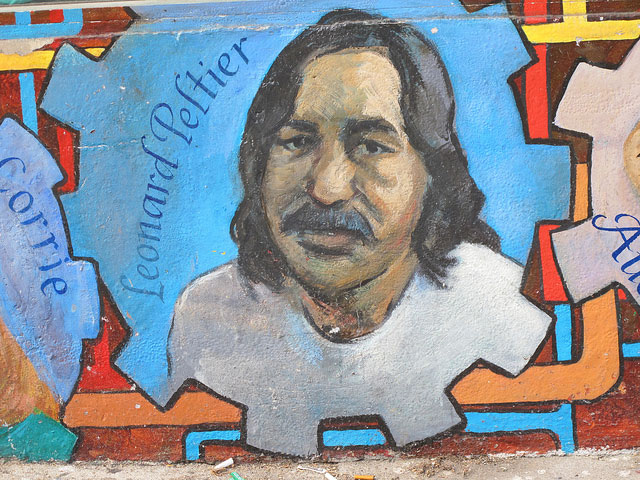
The former Iowa United States attorney in charge of the widely-condemned prosecution and conviction of Indigenous activist Leonard Peltier wrote to President Obama saying granting clemency to the 72-year-old, considered by many the longest-held political prisoner in the US, would be “in the best interests of justice.”
In writing the letter, James Reynolds, who was the chief prosecutor during Peltier’s 1977 trial as well as a subsequent appeal, joins Nobel Peace Prize winners Archbishop Desmond Tutu, Nelson Mandela and Rigoberta Menchu, as well as tens of thousands who have signed petitions calling for clemency for Peltier, who was convicted under dubious circumstances of the murder of two FBI agents on the Pine Ridge Reservation in 1975.
“It is truly extraordinary for the head prosecutor in such a politicized case to take a public stance contrary to the FBI. It is unprecedented to our knowledge,” said Martin Garbus, the lead counsel in Peltier’s petition for clemency. “We will urge President Obama to weigh Mr. Reynolds’ letter when considering Mr. Peltier’s case, and to examine the Petition with fresh eyes. We believe that Mr. Peltier’s conviction presents one of the greatest injustices in the history of the American justice system.”
Peltier has continually maintained his innocence and in the 40 years since the trial, original evidence continues to surface showing that Peltier was convicted under false pretenses. Amnesty International is just one of dozens of organizations who point out that a US appeals court judge found that the FBI withheld key ballistics evidence showing Peltier’s gun did not fire the bullets which killed the two agents and that the key testimony used to extradite Peltier from Canada, where he sought asylum, was perjured.
Reynolds’ letter comes as pressure mounts on President Obama — who has granted clemency to 1,176 prisoners, more than the previous 11 presidents combined — to finally pardon Peltier, who is gravely ill. Many worry that the veteran prisoner may die in prison given the scant hope that incoming President Trump would release the world-renowned political prisoner.
In an earlier interview, Garbus told Democracy Now! that former President Clinton had told Peltier’s defense team that he would grant clemency before leaving office in 2000, a promise he broke after a last-minute protest by FBI agents.
In support of Peltier’s release, Archbishop Tutu wrote, “In a nation which so prides itself on a strong and incorruptible judicial system and a human and responsive government, it is sad indeed to think that in nearly a (half) century, justice has been elusive for this man. If the matter continues without remedy and action, it will soon be too late for any justice at all. A tragedy of this magnitude cannot be allowed.”